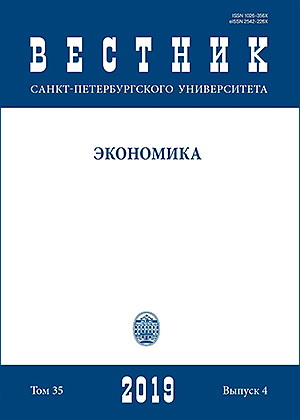Comparative Analysis of the Development of the Digital Economy in Russia and EU Measured with DEA and Using Dimensions of DESI
DOI:
https://doi.org/10.21638/spbu05.2019.405Abstract
The aim of this paper is to compare the development of the digital economy in Russia with that of the 28 countries of European Union (EU). Data were compiled from the European Commission’s International Digital Economy and Society Index (I-DESI 2018) database. After providing a brief overview of various alternative ways to measure the impact of information and communications technologies (ICT), we examine the most important features, advantages, and drawbacks of this database. We then describe the structure of our dataset and proceed with the analysis of the digital competitiveness of Russia and the EU-28. Our main research questions are concerned with the robustness of the EU data supply and the stability of its ranking. For this, we use the data envelopment analysis (DEA) method and the one-dimensional version of multidimensional scaling, which can also be employed for ranking issues. In addition to the conventional DEA method, we also investigate the viability of common-weights DEA models. We compare the results obtained to answer our questions. In evaluating the results, we also discern how data from Russia matches EU data on the digital economy. The comparison suggests that methods used in our study provide a similar solution, but the ranking of a few countries (including Russia) show wider variation.
Keywords:
DESI index, digital public administration, innovation, data envelopment analysis, multidimensional scaling, ranking
Downloads
References
References in Latin Alphabet
Downloads
Published
How to Cite
Issue
Section
License
Articles of the St Petersburg University Journal of Economic Studies are open access distributed under the terms of the License Agreement with Saint Petersburg State University, which permits to the authors unrestricted distribution and self-archiving free of charge.






